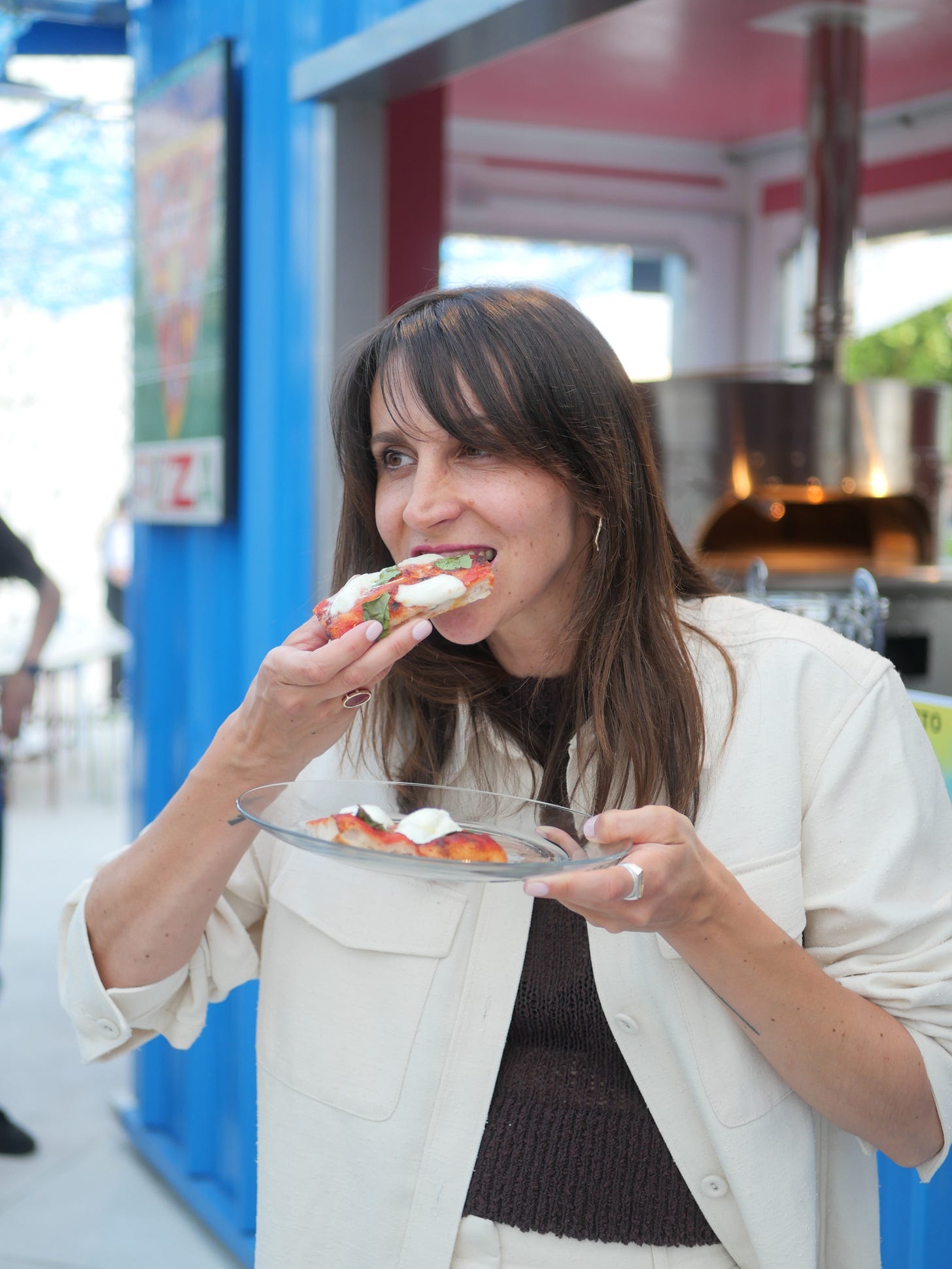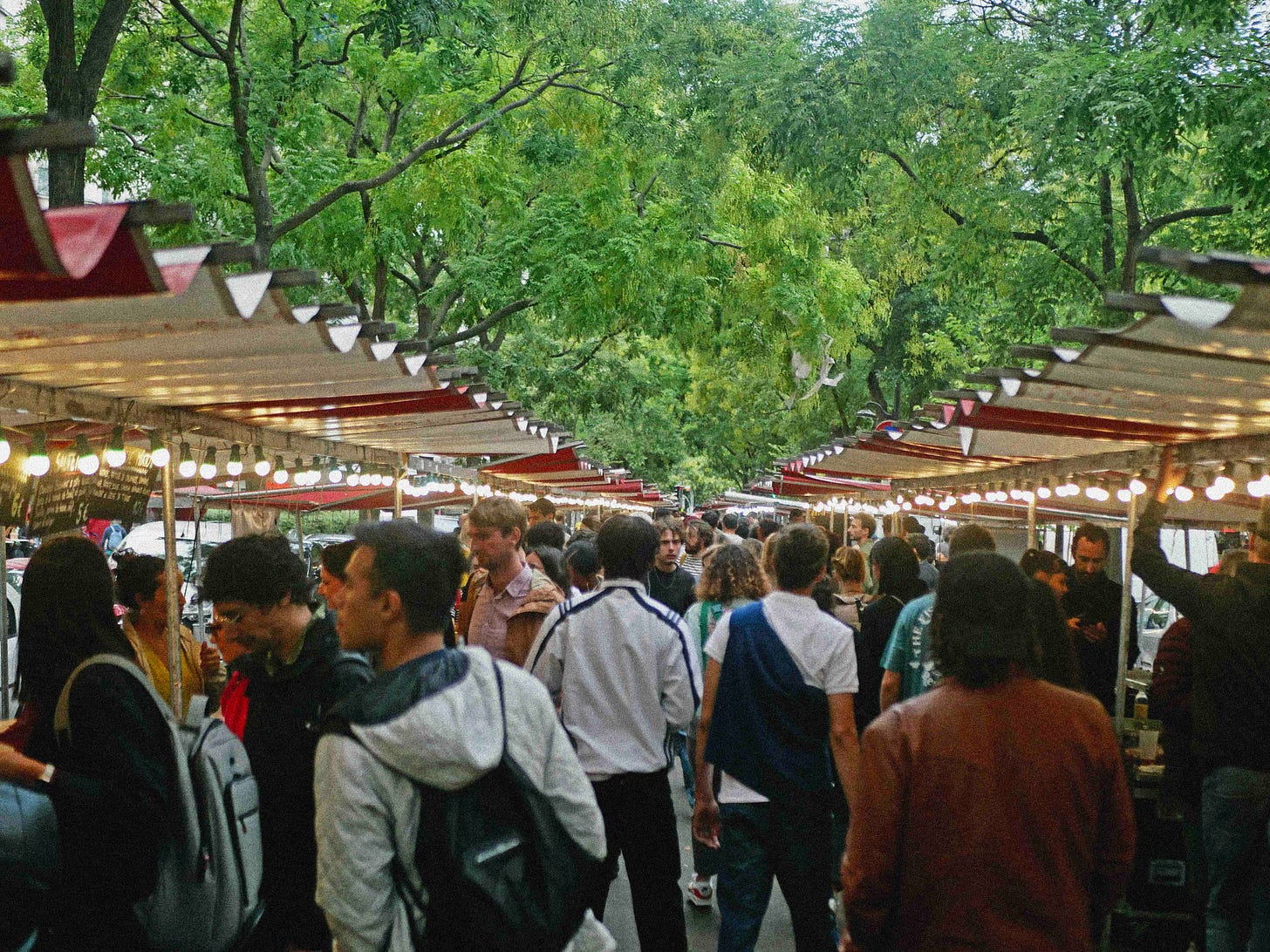Ten years of street food in Paris
A conversation with Le Food Market founder Virginie Godard on its 10th anniversary (+ events July 3-6!)
When I was writing The New Paris, burgers and tacos were the dominant, new-ish street foods to take Paris by storm. Today, between upmarket kebabs, arayes, baos, pizza, and all iterations of sandwiches, casual eats are a fixture of the dining scene. Much like the bistronomy movement, street food1 emerged in a rejection of formality and for clear economic reasons. For one, it was softer on wallets and typically cheaper for businesses to operate, both in commercial rent and expenses.
One of the figures who has contributed massively to making the good-but-cheaper movement of the last decade into a permanent genre of the landscape is Virginie Godard, founder of the event agency LFM and Le Food Market, a festive pop-up street food market that has operated with a dozen different vendors almost monthly on the Boulevard de Belleville since 2015. This weekend, Godard and her team celebrate Le Food Market’s 10th birthday with a series of events— beginning today with a special anniversary edition of the Belleville market, continuing with a pop-up shop from Friday through Sunday, and moving to the Left Bank with an all-day affair on rue du Bac in the 7th arrondissement.
Below, Virginie talks to me about bringing a concept like this to life, what’s been most challenging, and where more work is needed (hint: ⛽).
This conversation has been translated, edited and condensed for clarity.
It's been 10 years since Le Food Market began, but I'd like to begin with some context: why you launched it and why it was the right time. Can you take me back a bit?
More than ten years ago, there wasn't much street food; it wasn't valued. When you say that today, it sounds crazy, but it was very difficult to say that street food was of good quality. It was the beginning of “cool” food brands, but there was very little in the way of street food. There was fast food, and that’s very different. It was a totally different landscape. I went to Berlin and visited the MarktHalle Neun, which is a massive food court with lots of street food specialties. And I thought it was fantastic. People were engaging and laughing with one another, discovering new things; they were curious. This should exist in Paris! But we don't have any big market halls or big food venues. The conclusion was: I want to set it up. But if I were going to do it, I wanted to do it in a truly Parisian way.
Most of all, I wanted it to be very inclusive. Obviously, at the time, inclusivity wasn't a word we were really using, but I didn't want it to be something cool for "cool" people. So the challenge was to get it out onto the streets and fight for it, because it's a battle with the city council to get approval to do something on public grounds.
We set it up in a very working-class neighborhood, between the metro stations Ménilmontant and Couronne. The first Food Market began with a real desire and determination to create something open to everyone, to introduce people to good food that wasn't too expensive; we capped the price at €10 at the time. We wanted to stick to that principle for a long time. Today, it's difficult to maintain.
Did you come from the food world?
No, I was a nobody! I had no background in the food industry, so everyone told me I needed to lean on industry people, but I wanted to give it a go. My background wasn’t completely unrelated, though: I was in charge of organizing fashion shows, which is event planning—supersized event planning, selecting artisans and designers, and integrating them into a trade show with booths and locations. If you look at the Food Market, it's about managing locations and making selections that make sense. My team and I select chefs and restaurants, taste dishes, check that everything is good, and position them. It's not far off from what I was doing before, just a different focus.
How many of the vendors have been present from the start?
We have regulars but are always looking for new projects and participants. Blend, for example, has done 14 editions. That's huge. Fatima Délice, who's not here for the 10th anniversary because she's returned to live in Marrakech, had been with us from the beginning. She was making couscous at the Barbès market. I went to find her, queued up, and tasted her couscous. There have been over 100 editions of the Food Market, and she must have done 80 of them. It's crazy! But we have vendors who start out doing events to make a name for themselves and then stop or move on to their own projects. Everyone has very different goals.
In 10 years, street food has become omnipresent. Do you think that its staying power is a reflection of Parisian purchasing power or changing interests? Or is it more an indication of Paris catching up to what’s available in other global capitals?
If it’s here to stay, it’s because the quality has massively improved. Sure, it wasn't necessarily our way of consuming things. I know that firsthand, having worked on food hall projects and consulting on events. Food halls struggle to find an audience in France, particularly in Paris. Street food was a bit like that initially. I think it’s related to culture: sitting down in a restaurant with table service or going to a bakery to get a ham and butter sandwich or a quiche. Street food falls in between. But there were mediocre options or fast food that was cheap, and therefore not very good. I think the bistronomy boom, which broke the rules of gastronomy, really drove the shift and made space for street food. The cards were reshuffled. I think even people in street food realized that the overall move upmarket was forcing them to have better products, work harder on their offering, and perhaps market their work a little more.


Street food has certainly become more expensive over the years. McDo prices these are not!
True, much like everything in Paris. The other change in the last decade is that the public is more knowledgeable about seasonality, products, and how things are made. As a result, even restaurants that are a little less expensive are pushing themselves harder to do things better. I think we're raising the bar for everyone.
Aside from cost, what strikes you about the changes in the last ten years, which you clearly helped influence?
Just how many establishments exist today, especially on the right bank. All of these developments are positive so long as restaurant owners focus on soul. I think that when you believe in a project deeply and are truly passionate about what you do, it's really great. Obviously, there's always a fine line between authenticity and trends, but I think that if you focus on doing things well and you're still around after many years, it means there's substance.
I remember when The New Paris was released and some readers said to me, "Why would I come to Paris to eat a burger? I don’t want that.” That's when I realized that people, especially from outside France, think that Paris exists exclusively for them and that they couldn't understand the desire Parisians might have to try foods from other places, burgers or noodles or whatever it might be.
We needed it (because I include myself in this); we needed to be able to try other things. And how wonderful it was to break down barriers and discover other specialties. It was perhaps very French before and not very open to anything else. I think we can also link this sociologically to the fact that today, borders are easier to cross than they were for the generation before us. We have insane access so when we go looking for something new, we can see it. That is to say, we can't taste it, but we can see what's out there, and that makes us want it; it opens our imagination.






